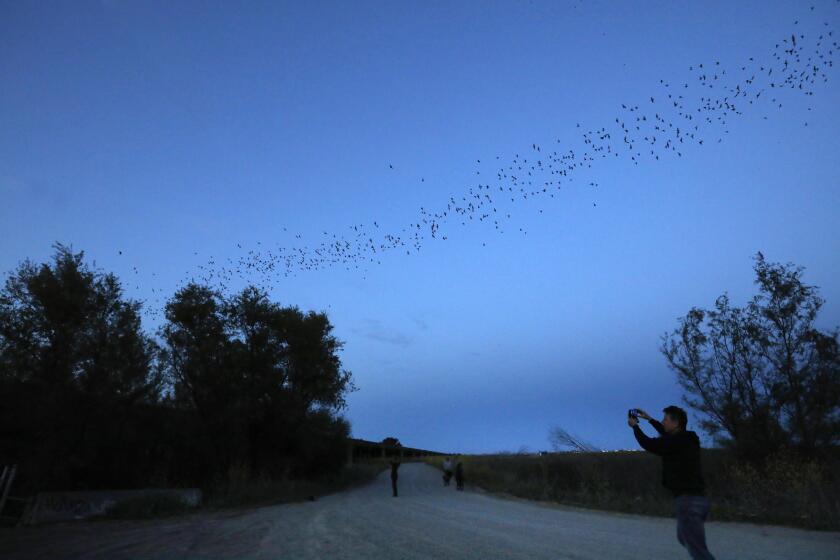Malathion Foes Escalate Attack on Spray Policy
SANTA ANA — Politicians and community organizers opposed to malathion spraying stated their case to a sympathetic audience of about 100 people Friday, saying that a state advisory to physicians warning of the pesticide’s health hazards re-enforces their concerns about the procedure.
“Our beaches are black with oil. Toxics are in the ocean . . . and now, toxics and carcinogens are in our air,” said Huntington Beach Councilman Paul Green, one of six panelists who attended a Rancho Santiago College forum on the issue of spraying malathion to combat the Mediterranean fruit fly.
A number of people at the forum complained about a letter by state and local health officials that cautioned doctors in Los Angeles and Orange counties that direct exposure to current levels of malathion spraying can cause headaches, chest tightening, nausea and eye and throat irritation.
At the same time residents in the spraying areas received literature from the state saying that the pesticide carries no health hazards. Health officials defended both positions, saying that the letter to doctors was simply technical and “frank.”
Green said the discrepancy “suggests duplicity on the part of the government.”
The two-hour discussion was marked by often bitter attacks against continued spraying in several Orange County cities and the lawmakers--notably Gov. George Deukmejian--who support it.
Opponents of malathion spraying passed out plastic fly swatters to the audience to show their solidarity; at one point, when one of the panelists assailed Deukmejian’s support for spraying, a member of the audience shouted, “Let’s storm the gates!” to the supportive cheers of others in the crowd.
“We have a situation here (where) the plants are threatened and the humans are expendable,” Bernard Turbow, a Orange County doctor and spraying foe. “You talk about absolute rulers. When (Deukmejian) took the oath of office, he said he would protect the people, not the plants.”
The governor was also attacked for regarding the Medfly infestation as a state of emergency while refusing to declare the oil spill off Huntington Beach a disaster.
Deukmejian’s attitude shows “how much of an influence the pesticide and farming industries have,” Green said. “You talk about chemical dependency. This is chemical dependency.”
State agriculture officials, who are carrying out the governor’s policy, could not be reached for comment Friday. Deukmejian has said in the past that spraying is necessary to prevent California’s farmlands from being devastated by the insects.
Much of the forum dealt with what effects malathion spraying has on the people who live in the target areas.
While county officials on the panel maintained that the spraying presents no measurable health threat, people at the forum told of friends and relatives who became so ill after their homes were sprayed that they temporarily moved out of their neighborhoods when the second onslaught came.
Thomas Prendergast, Orange County chief health officer, said the dose of malathion used in the sprayings--2.8 ounces per acre--does not pose a health risk for people on the ground.
“You don’t have a problem with malathion in the extreme low concentrations . . . used in this application,” he said.
Orange County Agriculture Commissioner Frank Parsons said that malathion was chosen for the spraying because the pesticide meets state and federal regulations and has been used in gardens, on dogs and in lice-killing shampoos for 40 years.
Spraying foes shot back that just because the chemical has been used for many years doesn’t mean that it is safe.
Furthermore, they said that the letters sent by state and local health officials to doctors in Los Angeles and Orange counties about headaches and eye and throat irritation that could be caused by exposure to the pesticide shows that spraying must stop until all health concerns are addressed.
Green said that the symptoms described in the letter are similar to those suffered by homeless people who live in areas that were sprayed. “But they’re not the ones to go to a doctor or complain,” he said.
More to Read
Sign up for Essential California
The most important California stories and recommendations in your inbox every morning.
You may occasionally receive promotional content from the Los Angeles Times.










